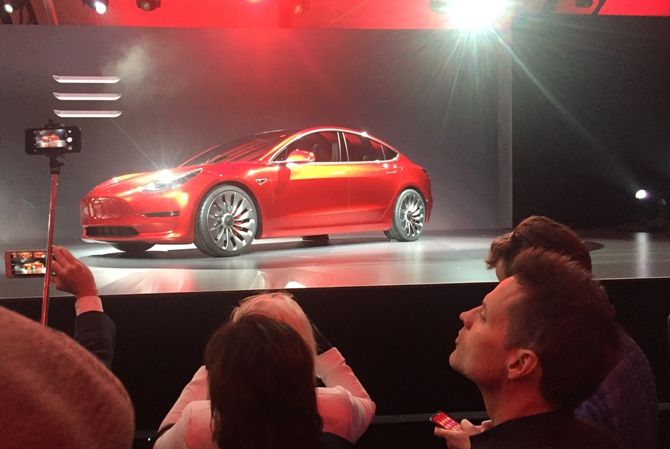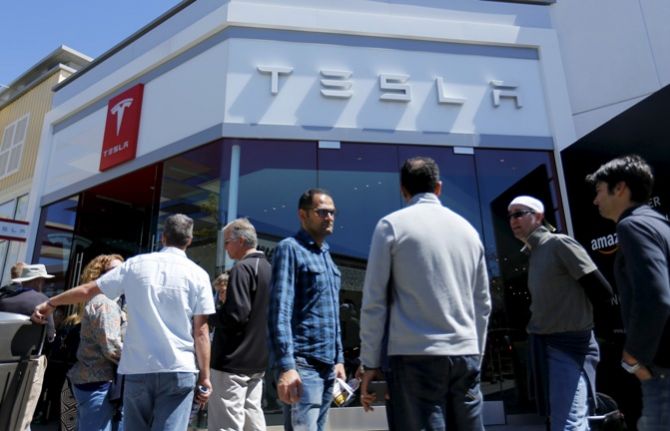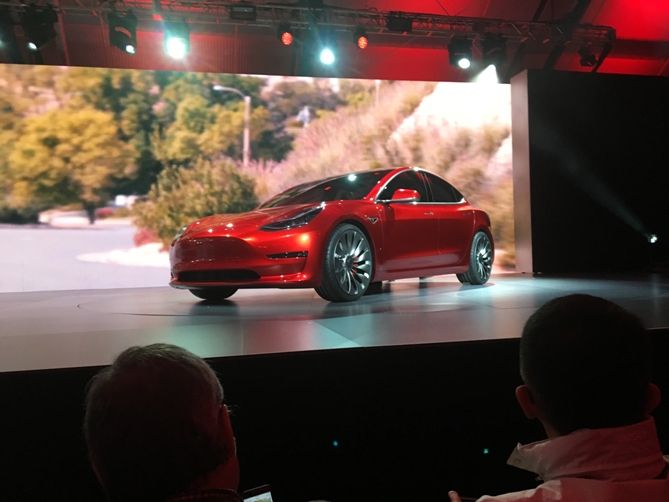Maruti Suzuki, Mahindra & Mahindra and Tata Motors have joined hands to take on the likes of General Motors, Nissan, Ford and Renault
On March 31, Canadian-American Elon Musk tweeted that India will be one of half-a-dozen countries where Tesla’s new all-electric Model 3 sedan will hunt for takers.
This little tweet made not just millions in India sit up and take notice, it also brought in customers for Musk.
A bunch of start-up CEOs right away swiped their credit cards as Tesla opened bookings for the sedan, the high price of the car (average price $42,000, or Rs 28 lakh) notwithstanding.
In just 24 hours, Model 3 received 180,000 orders worldwide, translating into business worth about $7.5 billion (Rs 50,250 crore).
Tesla has breathed more excitement into electric cars than what General Motors managed to do with the Chevrolet Volt or what Nissan did with the Leaf.
The Model 3 will not be delivered before 2017, as production is slated to begin only next year, yet a follow-up tweet from Musk said it all: “The future of electric cars looks bright!”
Once looked down upon due to their limited real-world usability, electric cars are suddenly finding new flavour across the globe.
Investments for product, component and allied infrastructure development are not just attracting companies but governments as well.
Back in India, rivals like Mahindra & Mahindra, Tata Motors and Maruti Suzuki (three of the top five car makers) have joined hands to find mutually beneficial solutions for electric cars.
Not only is the grand alliance targeted at making the cost of development more economical, it also aims to find faster solutions for the future of mobility.
Research and development teams of these companies are seeking one another’s expertise to develop solutions for captive use.
Though software, which controls the vehicle’s critical systems like engine and battery, and integration will remain exclusive to the three companies, hardware such as motor, transmission and batteries will be shared.
Arvind Mathew, chief executive of Mahindra Reva, is visibly excited about this tripartite partnership. “When the goal is common, it makes sense to join forces and work together,” says he.
“But it will take at least one-and-a-half years before we see something.”
Mahindra & Mahindra got serious about electric cars in 2010 when it acquired Reva Electric Car Company, founded by India’s best-known entrepreneur in the electric vehicle space, Chetan Maini.
The Bengaluru-based company has since then launched the e2o, a four-seat car, showcased a high-performance compact car called the Halo, developed electric variants of existing cars and even participated in the international racing championship of electric cars.

Joining hands
The Anand Mahindra-led company may be leading the pack at the moment but others are not far behind.
Tata Motors, India’s biggest automobile company, has successfully developed an electric Ace (mini truck), Vista (hatchback) as well as a petrol-electric hybrid car called Megapixel, which claims to return a mileage of 100 km/litre.
Timothy Leverton, president and head (advanced product engineering), Tata Motors, says: “The partnership is in early stages of development.
It is not just about one company taking responsibility for development but about the whole industry taking the responsibility.”
Tata Motors experimented with a fleet of electric Vistas in the UK a couple of years ago and did a year-long trial on the UK roads.
The response, Leverton claims, has been very encouraging.
Maruti Suzuki has been slow in the electric car race.

In none of the Auto Expos so far the company has shown any keenness to enter the space, though it has showcased hybrid cars.
CV Raman, executive director (engineering), Maruti Suzuki, the man behind the Vitara Brezza, says: “The project is at the initial proposal stage and there are many people looking into it. The terms of the partnership are yet to be worked out in detail.”
Coming together will help the three companies keep pace with foreign competitors like Renault, Nissan, Ford and General Motors, which have already made substantial investments in this area. Ford Motor Company, for example, is investing $4.5 billion in an electric car programme and plans to have 13 vehicles on the road by 2020.
According to rough estimates, about 50 per cent of the cost of an electric car is made of a single component: the battery.
Electric vehicles are more expensive than equivalent combustion engines mainly because of the battery.
For instance, the Mahindra Reva e20, the only electric car on sale in the country, costs Rs 7.51 lakh (ex-showroom Delhi) without Mahindra & Mahindra’s car protection plan, but with a government incentive priced in.
This price is almost on a par with India's largest selling mid-sized sedan, Honda City, which is nearly twice its size.
Batteries are not made in India and have to be imported from China.
As the Chinese government is out to combat pollution, the nation has become the battery supplier to the world.
China thus dictates international prices of batteries, which as of today are made of lithium-ion, also found in our mobile phones.
Getting cheaper
But the good news is that the cost of batteries has fallen sharply over the past nine years, according to a global study.
From $1,000 per Kwh in 2007, General Motors says it is confident that this year it will reach $145 per Kwh. Tesla says it hopes to see battery cost reach $100 per Kwh by 2020, which will allow it to sell the Model 3 at an affordable price.
Girish Wagh, senior vice-president, programme planning and project management, Tata Motors, says: “Fortunately, battery prices are coming down significantly and as and when this technology begins to make economic sense, we will bring it.”
Indian agencies are doing their bit too.
The Automotive Research Association of India, the country’s premier research and vehicle testing institute, has joined hands with the Vikram Sarabhai Space Centre to modify the batteries currently used to power aircraft for electric vehicles.
The Vikram Sarabhai Space Centre has successfully lab-tested the battery technology for auto-sector applications. ARAI will test it at the vehicle level and will come out with a prototype in about one year’s time.
On April 1 last year, the government launched the Faster Adoption and Manufacturing of Hybrid and Electric vehicles -- India scheme.
The scheme was launched as part of the National Mission for Electric Mobility to boost eco-friendly vehicles sales in the country.
The overall scheme is proposed to be implemented over a period of five years -- that is till 2020.

It envisages providing Rs 795 crore (Rs 7.95 billion) support till 2020 for the manufacturing and sale of electric and hybrid vehicles.
Technology development, pilot projects, demand creation and charging infrastructure are the four focus areas of the scheme.
Direct incentives in the range of Rs 1,800 for scooters to Rs 138,000 for cars above four meters in length are given to buyers of electric vehicles.
This subsidy scheme has helped the long-neglected industry in a significant way.
According to the Society of Manufacturers of Electric Vehicles, the apex lobby body which has a membership of almost a dozen companies, 22,000 two-, three-, and four-wheeled electric vehicles were sold in 2015-16, up 38 per cent from 16,000 in 2014-15.
Images: (Top 4) Tesla Motors' Model 3. Photographs: Kind courtesy, Teslamotors.com











